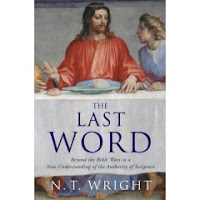 In January of 2007, I visited Mars Hill Bible Church in Grand Rapids, MI for a conference called, "Isn't She Beautiful?" This was a gathering of leaders designed to celebrate and offer hope for the future of the church. It was one of the most profound experiences of my life. I felt like my eyes were opened for the first time in regard to many concepts and issues that I had never previously considered. The biggest major discovery that I had was that of the concept of Narrative Theology. I attended a breakout session led by a guy named Matt Krick, who is sort of the Narrative Theology guru at Mars Hill and within the first twenty minutes of a 90 minute session, he had completely changed my paradigm forever. I'm going to summarize this concept very succinctly, but if this is something you're actually interested in, there is a brilliant article by NT Wright that treats this concept in a very accessible way.(Click here to read it.)
In January of 2007, I visited Mars Hill Bible Church in Grand Rapids, MI for a conference called, "Isn't She Beautiful?" This was a gathering of leaders designed to celebrate and offer hope for the future of the church. It was one of the most profound experiences of my life. I felt like my eyes were opened for the first time in regard to many concepts and issues that I had never previously considered. The biggest major discovery that I had was that of the concept of Narrative Theology. I attended a breakout session led by a guy named Matt Krick, who is sort of the Narrative Theology guru at Mars Hill and within the first twenty minutes of a 90 minute session, he had completely changed my paradigm forever. I'm going to summarize this concept very succinctly, but if this is something you're actually interested in, there is a brilliant article by NT Wright that treats this concept in a very accessible way.(Click here to read it.)Basically, the idea is this: While the Bible is a collection of various documents from various parts of history, the finished work is a moving story that exists in multiple stages. NT Wright offers a very helpful illustration: What if archaeologists somehow unearthed a never-before-seen Shakespearean play? It is a masterpiece in five acts. The only caveat is this: The fifth act is incomplete. If this were to happen, scholars would be faced with two options: 1) To preserve the work in a museum or 2) to gather the greatest Shakespearean scholars, writers, actors, and historians together to ask the question, "Understanding what we know about Shakespeare and understanding how the first four acts progress, how would Shakespeare have finished the play?
Wright proposes that with Scripture, we are faced with the same basic structure. He suggests that the Bible is a single narrative that is broken into five acts:
Act 1: Creation (Genesis 1-2)
Act 2: The Fall (Genesis 3-11)
Act 3: Israel (Genesis 12 - Malachi)
Act 4: Jesus (Matthew - John)
Act 5: The Church (Acts-Revelation 20)
As a part of this proposition, we--the Church--are challenged to live as though the Fifth Act were not yet complete. With this understanding, we are to view ourselves as actors who exist within the divine narrative and we may now begin to contribute to this Fifth Act.
 In a book titled The Drama of Scripture, Michael Goheen and Craig Bartholomew suggest that there is, in fact, a Sixth Act that is alluded to in the final two chapters of Revelation in which all things are finally restored.
In a book titled The Drama of Scripture, Michael Goheen and Craig Bartholomew suggest that there is, in fact, a Sixth Act that is alluded to in the final two chapters of Revelation in which all things are finally restored. Again, there is much more that could (and should) be said about this concept, but for the sake of time, I'll leave this as it is. If you're curious about a deeper unfolding of this concept, check out Wright's book The Last Word.
Again, there is much more that could (and should) be said about this concept, but for the sake of time, I'll leave this as it is. If you're curious about a deeper unfolding of this concept, check out Wright's book The Last Word.
2 comments:
I don't have any enlightening comments to make about the content of this post, but I thought I'd inform you that I love the way you write.
I didn't know you had one of these! Sweet.
I like that idea, kind of like the Bible is open-ended. It includes us in the story, which I think is legitimate. It also gives us more responsibility. I'm apart of God's story. I like that.
Post a Comment